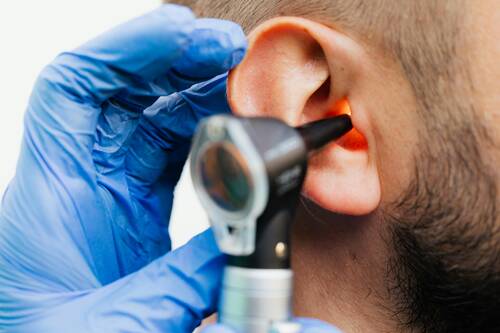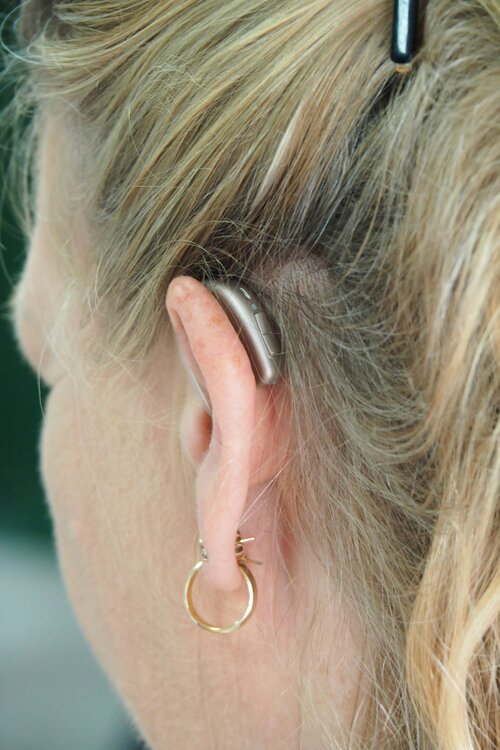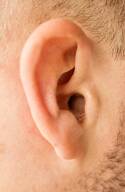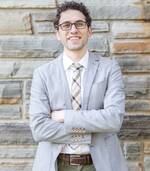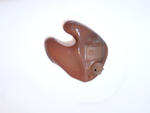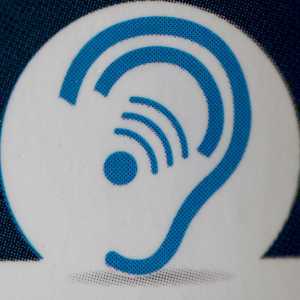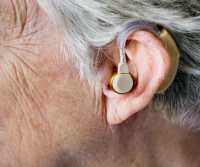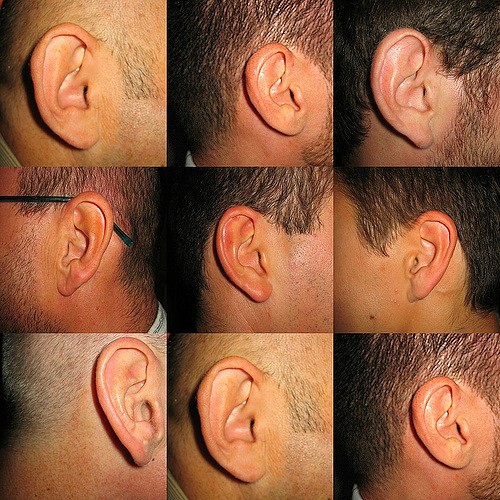If you have tinnitus, it can range from aggravating to a daily agony. If you have a relatively mild case, you can often live with it fairly easily. If you have a much worse case, though, it’s distinctly difficult to get through your daily life.
Getting rid of tinnitus isn’t usually possible, though there are ways to treat it that have been proven effective. Let’s take a moment to discuss where medical science is with tinnitus research. If this condition affects you, then you will certainly want to be paying attention to this information.
(more…)
Hearing Loss / 04.02.2025
The Future of Tinnitus Treatment: Breakthroughs That Could Silence the Noise
 Living with tinnitus often feels like a constant battle against sounds that refuse to fade. Whether it’s a high-pitched ringing, a steady hum, or an unpredictable buzzing, the condition can disrupt nearly every part of daily life. Sleep becomes difficult, focus weakens, and the emotional toll can be overwhelming. For years, available treatments have focused more on managing symptoms than providing lasting relief.
Now, that’s beginning to change. Advances in neuroscience, medical research, and technology are uncovering the underlying causes of tinnitus, bringing a wave of new treatments that go beyond simply masking the noise. The potential for lasting relief—or even complete elimination—feels closer than ever.
Living with tinnitus often feels like a constant battle against sounds that refuse to fade. Whether it’s a high-pitched ringing, a steady hum, or an unpredictable buzzing, the condition can disrupt nearly every part of daily life. Sleep becomes difficult, focus weakens, and the emotional toll can be overwhelming. For years, available treatments have focused more on managing symptoms than providing lasting relief.
Now, that’s beginning to change. Advances in neuroscience, medical research, and technology are uncovering the underlying causes of tinnitus, bringing a wave of new treatments that go beyond simply masking the noise. The potential for lasting relief—or even complete elimination—feels closer than ever.
Advancements in Neuromodulation Therapy
Neuromodulation is emerging as a leading approach to tinnitus treatment. Unlike conventional methods that focus on distraction or symptom management, this therapy targets the neural circuits responsible for generating phantom sounds. Techniques such as transcranial magnetic stimulation (TMS) and transcranial direct current stimulation (tDCS) aim to modify brain activity, potentially reducing tinnitus intensity. One particularly exciting development is paired stimulation, which integrates sound therapy with electrical or magnetic pulses. This approach to tinnitus patients is designed to retrain the brain’s response to tinnitus by strengthening normal auditory pathways while weakening abnormal ones. Early studies suggest that regular sessions may lead to long-term improvements, even after treatment ends. Clinics like Regain Hearing are closely monitoring these advancements, ensuring that individuals with tinnitus have access to the latest diagnostic tools and therapies as they become available.
While neuromodulation remains in the experimental stage, ongoing clinical trials continue to refine these techniques. Personalized therapies tailored to an individual’s specific tinnitus profile may soon become widely accessible, offering new options for those who have struggled to find effective solutions.
(more…)
One particularly exciting development is paired stimulation, which integrates sound therapy with electrical or magnetic pulses. This approach to tinnitus patients is designed to retrain the brain’s response to tinnitus by strengthening normal auditory pathways while weakening abnormal ones. Early studies suggest that regular sessions may lead to long-term improvements, even after treatment ends. Clinics like Regain Hearing are closely monitoring these advancements, ensuring that individuals with tinnitus have access to the latest diagnostic tools and therapies as they become available.
While neuromodulation remains in the experimental stage, ongoing clinical trials continue to refine these techniques. Personalized therapies tailored to an individual’s specific tinnitus profile may soon become widely accessible, offering new options for those who have struggled to find effective solutions.
(more…)
ENT, Hearing Loss / 27.12.2024
5 Signs You Need to Visit a Hearing Centre Today
Hearing is one of the most critical senses, allowing us to connect with the world, communicate effectively, and enjoy life’s simplest pleasures. Yet, many people take their hearing for granted until they notice a decline. While minor changes in hearing may seem insignificant at first, they can lead to more serious problems if ignored. Thankfully, if you live in Shrewsbury, you have access to exceptional hearing centres that can help you maintain or restore your hearing health.
In this blog, we’ll explore five signs that indicate it’s time to book an appointment with a hearing centre.
Recognizing these signs early can make all the difference in your quality of life.
1. Struggling to Understand Conversations
Do you find yourself asking people to repeat themselves often? Is it particularly challenging to follow conversations in noisy environments, such as cafes, restaurants, or family gatherings? If so, this could be an early sign of hearing loss. Hearing loss often starts with difficulty understanding speech, especially when there’s background noise. You may feel like people are mumbling or speaking too softly, even when they’re not. This can lead to frustration and social withdrawal over time. Why Visit a Hearing Centre? Hearing centres are equipped with advanced diagnostic tools to assess your hearing accurately. Professionals can identify whether your issue is due to hearing loss, earwax buildup, or another condition, and recommend appropriate solutions. (more…)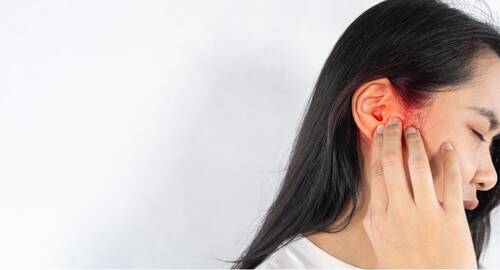
How Weather Affects the Human Body
Weather exerts a broad spectrum of influences on physiological systems that keep us vibrant, well-functioning, and ever-adapting. From the skin, which shields us, to core temperature regulation, it is paramount to comprehend how these external factors play pivotal roles in the dance of resilience. Temperature variations and atmospheric shifts can also influence our comfort, affecting hydration, energy levels, and even our ability to focus and perform tasks effectively.The Body's Reaction to Temperature Shifts
Temperature variations have a direct—yet often underappreciated—impact on the delicate balance of our auditory system. As the mercury rises or falls, our bodies instinctively adjust, causing expansions and contractions within the ear structure that may impact how we perceive sound. These changes, while potentially bothersome, signify a remarkable biological resilience—a testament to the body's ability to navigate the dynamic symphony of nature's cues and maintain equilibrium in a shifting environment. (more…)
Hearing is one of those things most of us take for granted—until it starts to slip away. We often ignore the subtle signs, brushing them off as temporary or insignificant. But here's the thing: your hearing health is crucial, and neglecting it can lead to long-term issues that might have been easily preventable. So, let’s chat about the top five signs that it might be time for you to schedule a visit to an audiologist.
1. Struggling to Hear Conversations
Ever find yourself nodding along in a conversation, pretending you heard what someone said, but really, you’re just lost? Maybe you’re constantly asking people to repeat themselves, especially in places with background noise like restaurants or crowded rooms. This is a classic sign of hearing loss. When you start missing parts of conversations or have to focus intensely just to catch what's being said, it’s not something to brush off. An audiologist in Massapequa, Long Island, can assess your hearing and help you get back to enjoying conversations without the stress.Why It Matters:
- Social connections - Good hearing is key to maintaining strong relationships and staying socially engaged.
- Mental health - Struggling to hear can lead to isolation, frustration, and even anxiety or depression over time.
Author Interviews, Brigham & Women's - Harvard, Genetic Research, Hearing Loss, Lancet, Pediatrics / 29.01.2024
Gene Therapy Restores Hearing In Trial of Autosomal Recessive Pediatric Deafness
MedicalResearch.com Interview with:
Zheng-Yi Chen, D.Phil.
Department of Otolaryngology-Head and Neck Surger
Harvard Medical School
Boston, MA
MedicalResearch.com: What is the background for this study? Would you briefly explain the process and indication
Response: This clinical trial is to use gene therapy to treat a type of genetic hearing loss. Genetic hearing loss mainly affects children. One in 600 newborns can have genetic hearing loss. There is no drug treatment for any type of hearing loss except for cochlear implants, which have limitations. This study focuses on a type of genetic hearing loss, DFNB9, due to a missing gene called Otoferlin. Without Otoferlin, children are born with complete hearing loss and without the capacity to speak. The goal of the trial is to study if gene therapy is safe and efficacious in treating children so they can regain hearing and the ability to speak.
(more…)
Author Interviews, Hearing Loss, JAMA, Pediatrics, USPSTF / 28.01.2024
USPSTF: Statement on Pediatric Screening for Speech and Language Delay and Disorders
MedicalResearch.com Interview with:
Li Li, M.D., Ph.D., M.P.H
Walter M. Seward Professor
Chair of Family Medicine
Director of population health
University of Virginia School of Medicine
Editor-in-chief of The BMJ Family Medicine
Dr. Li joined the U.S. Preventive Services Task Force in January 2021
MedicalResearch.com: What is the background for this study? What are the main findings?
Response: Speech and language delays and disorders can be challenging for children and their families and can lead to difficulties with reading and writing as children grow up.
The Task Force looked at the evidence on screening for speech and language delays and, unfortunately, there is not enough evidence to tell us whether or not it is helpful to screen all children 5 years old and younger for speech and language delays and disorders.
(more…)
Hearing Loss / 08.01.2024
5 Ways Hearing Aids Will Improve Your Life
One step at a time, hearing aids are becoming an almost mandatory part of the superior hearing experience....
Aging, Author Interviews, Geriatrics, Hearing Loss, JAMA / 31.07.2023
“I Can’t Hear You”……Study Finds Most Older Adults Have Hearing Loss
MedicalResearch.com Interview with:
Nicholas S. Reed, AuD PhD
Assistant Professor | Department of Epidemiology
Johns Hopkins University Bloomberg School of Public Health
MedicalResearch.com: What is the background for this study?
Response: To date, national estimates of hearing loss have often been based on self-report, which is a fine metric in its own right but underestimates the prevalence of hearing loss against criterion standard measures, and most studies with criterion-level hearing measures are limited to relatively younger samples of older adults. For example, some previous nationally representative samples don't allow reporting age data over 80 years because there aren't enough participants in that age group. It is not surprising given that it is difficult to design nationally representative studies that truly allow older adults (80+ years) to participate and measuring hearing can be onerous. However, understanding the prevalence of hearing loss in this age group is vital for public health and policy planning efforts to address hearing loss at the national level.
(more…)
This article is for informational purposes only and is not a substitute for professional medical advice, diagnosis or treatment. Contact...
Aging, Alzheimer's - Dementia, Author Interviews, Hearing Loss, JAMA, Johns Hopkins / 10.01.2023
Johns Hopkins Study Strengthens Link Between Hearing Loss and Dementia
This article is for informational purposes only and is not a substitute for professional medical advice, diagnosis or treatment. Contact a qualified medical professional before engaging in any physical activity, or making any changes to your diet, medication or lifestyle,
MedicalResearch.com Interview with:
Alison R. Huang, PhD MPH
Senior Research Associate
Cochlear Center for Hearing & Public Health
Department of Epidemiology
Johns Hopkins Bloomberg School of Public Health
MedicalResearch.com: What is the background for this study? What are the main findings?
Response: Hearing loss is a critical public health issue affecting two-thirds of older adults over 70 years old. There is growing understanding of a strong link between hearing loss and dementia, which impacts millions of Americans.
Our main findings are that in a nationally representative sample of older adults in the United States from the National Health and Aging Trends Study, every 10 decibel increase in hearing loss was associated with 16% greater prevalence of dementia, such that prevalence of dementia in older adults with moderate or greater hearing loss was 61% higher than prevalence in those with normal hearing.
We also found that in older adults with moderate or greater hearing loss, hearing aid use was associated with a 32% lower prevalence of dementia.
(more…)
Author Interviews, COVID -19 Coronavirus, Hearing Loss, JAMA / 04.05.2022
COVID-19: $1000 Incentive Increased Vaccination Rates
MedicalResearch.com Interview with:
Archelle Georgiou, MD
Chief Health Officer for Starkey
Starkey Hearing Technologies
Eden Prairie, Minnesota
MedicalResearch.com: What is the background for this study?
Response: In August 2021, Starkey introduced a vaccination incentive program for employees in the U.S. to provide education on COVID-19 and encourage vaccinations. The program encouraged employees to watch and acknowledge online educational information and report their vaccination status. Those fully vaccinated and who submitted proof of vaccination by September 2021, including employees who were vaccinated prior to the incentive announcement, received $1,000. (more…)
Aging, Author Interviews, Geriatrics, Hearing Loss, JAMA, USPSTF / 02.04.2021
USPSTF Reviews Screening for Hearing Loss in Older Adults
MedicalResearch.com Interview with:
Chien-Wen Tseng, M.D., M.P.H., M.S.E.E.
The Hawaii Medical Service Association Endowed Chair
Health Services and Quality Research
Professor, and Associate Research Director
Department of Family Medicine and Community Health
University of Hawaii John A. Burns School of Medicine
MedicalResearch.com: What is the background for this study? What are the main findings?
Response: Age-related hearing loss cannot be reversed and can be a significant problem for older adults. Four out of 10 adults who are age 70 and older report hearing loss and it can worsen isolation, cognitive decline, and quality of life, as well as interfere with someone’s ability to live independently. There are simple screening tests to detect hearing loss, so the Task Force did an extensive review of whether there are health benefits to screening for hearing loss in people who do not have symptoms before they notice any hearing problems.
The Task Force determined that there is not enough evidence to recommend for or against screening for hearing loss in adults who are age 50 and older and do not have signs or symptoms of hearing loss. This is an I statement. (more…)
Author Interviews, Cognitive Issues, Hearing Loss, JAMA, Race/Ethnic Diversity / 23.12.2020
Hearing Loss Linked to Dementia Risk in Hispanic Communities
MedicalResearch.com Interview with:
Ariana M. Stickel, Ph.D.
Postdoctoral Scholar
Department of Neurosciences
University of California, San Diego
MedicalResearch.com: What is the background for this study?
Response: Latinos are projected to have the largest increase in Alzheimer’s disease and related dementia in the coming years, yet we know so little about important risk factors for dementia amongst Latinos.
As there has been too little widespread research on diverse Latinos and dementia until recently, we examined the individual and combined relationships of two important risk factors for dementia --hearing impairment and cardiovascular disease risk--in over 9,000 Latinos 45 – 74 years old.
Diverse Latinos participated in the study, including Central Americans, Cubans, Dominicans, Mexicans, Puerto Ricans and South Americans residing in the Bronx, NY; Chicago, IL; Miami, FL and San Diego, CA. It is important to study a wide range of Latinos in order to appropriately reflect the diversity of this population.
Each participant underwent extensive cardiovascular and diabetes testing, hearing examinations, and cognitive assessments.
(more…)
Author Interviews, Geriatrics, Hearing Loss, JAMA, Race/Ethnic Diversity, Social Issues / 10.12.2020
Disparities in Hearing Aid Ownership Among Older Adults
MedicalResearch.com Interview with:
Nicholas S. Reed, AuD
Assistant Professor | Department of Epidemiology
Core Faculty | Cochlear Center for Hearing and Public Health
Johns Hopkins University Bloomberg School of Public Health
MedicalResearch.com: What is the background for this study?
Response: It is known that hearing aid ownership is relatively low in the United States at less than 20% of adults with hearing loss owning and using hearing aids. However, many national estimates of hearing aid ownership are based on data that is over 10 years old. Our team was interested in trying to understand whether ownership in hearing aids had changed over time. We used data from 2011 to 2018 in a nationally representative (United States) observational cohort (The National Health and Aging Trends Study) of Medicare Beneficiaries aged 70 years and older to estimate the change in hearing aid ownership.
In our analysis, the proportion of Medicare beneficiaries 70 years and older who reported owning and using their hearing aids increased 23.3% from 2011 to 2018. However, this growth in ownership was not equal across all older adults. For example, while White males saw a 28.7% increase in hearing aid ownership, Black females saw only a 5.8% increase over the same 8-year period. Moreover, adults living at less than 100% federal poverty level actually saw an overall 13.0% decrease in hearing aid ownership while those living at more than 200% federal poverty line saw an overall 30.6% increase. (more…)
Author Interviews, COVID -19 Coronavirus, Hearing Loss / 06.11.2020
Tinnitus and Hearing Loss Exacerbated By COVID-19
MedicalResearch.com Interview with: Dr Eldré Beukes PhD Clinical Scientist in Audiology Clinical Audiologist: Spire Cambridge Lea Hospital Associate lecturer: Anglia Ruskin University, Cambridge MedicalResearch.com: What is the background for this study? Would you briefly explain what is meant by tinnitus? Response: Tinnitus is characterised by hearing unwanted sounds, such as a ringing or buzzing, without a corresponding sound in the environment. It is one of the most frequently occurring chronic conditions, affecting 1 in 8 adults worldwide. People with tinnitus are found to be at higher risk of lower emotional wellbeing, depression and anxiety. This led our team to realise that tinnitus may be more problematic as a result of the added stress and anxiety brought on by the pandemic. As such, we initiated an exploratory study to examine changes in tinnitus during the pandemic. (more…)
Author Interviews, Geriatrics, Hearing Loss, JAMA / 28.08.2020
Cochlear Implants May Be Superior to Hearing Aids for Some Older Adults
MedicalResearch.com Interview with:
Cameron C. Wick, MD
Assistant Professor, Otology/Neurotology
Washington University School of Medicine
St. Louis, MO
MedicalResearch.com: What do you see as the primary message of your findings for the general public?
Response: Older adults not satisfied with their hearing aids achieved clinically meaningful improvement in both hearing and quality of life with a cochlear implant compared to an optimized bilateral hearing aid condition.
MedicalResearch.com: Do you see your findings as changing the way older adults with hearing loss are managed?
Response: Yes and partially because this study is unique in its design and the outcomes that were measured. Specifically the study is a prospective, multicenter clinical trial conducted at 13 locations across the United States. All patients were setup with a 30-day optimized hearing aid experience before cochlear implantation (context: sometimes hearing aids are not appropriately optimized so baseline testing may not reflect the "best" that hearing aids can do). This study assesses both hearing data as well as quality of life data before and 6-months after cochlear implantation. After implantation patients were tested in both the unilateral (cochlear implant alone) and bimodal (cochlear implant plus hearing aid in the opposite ear) conditions. My paper is a subanalysis of adults 65 years and older (range 65 - 91 years) enrolled in the clinical trial. The principal investigator of the clinical trial is Dr. Craig Buchman. Dr. Buchman and myself are at Washington University in St. Louis which was the lead center for the clinical trial.
The findings of the study are meaningful because they demonstrate clear superiority of cochlear implants over hearing aids in many key areas, such as understanding speech, hearing in background noise, and ability to communicate. Hearing loss, which becomes more prevalent as we age, can negatively impact communication leading to social isolation, depression, frustration, and possibly cognitive decline. This study highlights that if patients are not satisfied with their hearing aid performance then they should be referred to a center that can evaluate for cochlear implantation. Cochlear implant indications have evolved considerably since they were first FDA approved in 1984. This study emphasizes that patients do not have to be profoundly deaf to experience significant hearing and social benefits from cochlear implants. Also, it demonstrates that cochlear implant surgery is well tolerated even as adults age and acquire other health ailments. (more…)
Author Interviews, End of Life Care, Hearing Loss / 09.07.2020
Dying Unconscious Patients May Still Be Able to Hear
MedicalResearch.com Interview with:
Elizabeth Blundon PhD
Department of Psychology
University of British Columbia – Vancouver
MedicalResearch.com: What is the background for this study?
Response: Many healthcare workers have noticed that dying patients appear to be comforted by the words of their loved ones, even when patients appear to be unconscious and are no longer able to communicate. There is a persistent belief, therefore, that hearing may persist into the last hours of someone's life. Our study attempts to detect evidence of hearing among a small group of unresponsive hospice patients at the end of life.
To do this, we compared the brain activity of young, healthy control participants, with the brain activity of hospice patients, both when the patients were awake and responsive, and again when they became unresponsive. The brain activity we measured was in response to a complex series of tone-patterns, where participants were asked to identify by pressing a button (control participants) or by counting (hospice patients) every time they heard a tone-pattern that was different from the rest of the series. (more…)
Alzheimer's - Dementia, Author Interviews, Hearing Loss / 28.02.2020
Hearing Aids May Preserve or Improve Cognition in Older Adults
MedicalResearch.com Interview with:
Julia Sarant, PhD
Associate Professor
Department of Audiology and Speech Pathology
Faculty of Medicine, Dentistry and Health Sciences
Melbourne School of Health Sciences
MedicalResearch.com: What is the background for this study?
Response: Dementia is a rapidly growing global problem. Hearing loss has been identified by the Lancet Commissions as a modifiable risk factor for dementia. There is no treatment for dementia.
This study investigated the effect of hearing aid use on cognition over time in older adults, objectively assessing hearing loss treatment, compliance and benefits while controlling for the effects of other known risk factors for dementia. (more…)
Author Interviews, Brigham & Women's - Harvard, Hearing Loss / 14.02.2020
Brain Biomarkers May Lead to Clinical Tests for Hidden Hearing Loss
MedicalResearch.com Interview with:
Aravindakshan Parthasarathy, PhD
Researcher, Massachusetts Eye and Ear
Instructor in Otolaryngology–Head and Neck Surgery
Harvard Medical School
MedicalResearch.com: What is the background for this study? Would you briefly explain what is meant by Hidden Hearing Loss?
Response: Our ears were not designed for the society our brains created. The World Health Organization estimates that 1 billion young adults are at risk for hearing loss due to prolonged exposure to excessive environmental noise. Anatomical analysis of human ears has shown that half of the nerve fibers connecting the ear to the brain have degenerated by the time we reach 40 years of age. Many of us experience the first symptoms of hearing loss as a difficulty following conversations in crowded places such as restaurants.
Hidden hearing loss is an umbrella term used to describe such hearing difficulties experienced by people who show no abnormalities on any of the current tests of hearing used in the clinic. Approximately 10% of visitors to our hospital hearing clinic fit this profile, arriving with a primary complaint of poor hearing but being sent home with a clean bill of hearing health. (more…)
Author Interviews, Education, ENT, Hearing Loss, JAMA, Pediatrics / 30.11.2019
Impact of Mild Hearing Loss on Childhood Behavior and School Performance
MedicalResearch.com Interview with:
Dr. Carlijn M. P. le Clercq, MD
Speech and Language Pathology, Pediatrics, Otolaryngology
Erasmus MC, Rotterdam
MedicalResearch.com: What is the background for this study?
Response: Recently, more reports have been publishes about the prevalence of slight to mild hearing loss among children in the general population. These studies showed that slight hearing loss is common, also within our population-based cohort in the Netherlands. Slight hearing loss is often scored as “not relevant”. We wanted to examine if we could find associations of hearing thresholds in children with performance scores in everyday life.
(more…)
Author Interviews, Hearing Loss, JAMA, NIH, NYU / 24.05.2019
NIH Spends Relatively Little on Hearing Loss
MedicalResearch.com Interview with:
Jan Blustein, MD PhD
Professor of Health Policy and Medicine
Wagner Graduate School and School of Medicine
New York University, New York
MedicalResearch.com: What is the background for this study?
Response: The National Institutes of Health (NIH), the nation’s largest public funder of health research, provides annual reports about levels of funding for many diseases and conditions. These reports, issued as part of the NIH’s Research, Condition and Disease Categorization (RCDC) process, allow members of the public to track funding across key conditions and across time.
Hearing loss is not included among the reported conditions. This runs counter to two of the NIH’s stated goals, according to researcher Jan Blustein (M.D., Ph.D.), professor of health policy and medicine at New York University’s Robert F. Wagner Graduate School of Public Service, in a Research Letter in the May 15th issue of the Journal of the American Medical Association Otolaryngology and Head & Neck Surgery.
“First, the NIH is committed to transparency about how it divides funds across diseases and conditions,” said Dr. Blustein. “Second, it has said that it will prioritize its funding to those conditions that cause the greatest disease burden.” Hearing loss causes great disease burden, ranking 10th in the U.S. among all conditions as a contributor to Disability Adjusted Life Years (a widely-used measure of disease burden), according to the World Health Organization.
(more…)
MedicalResearch.com Interview with:
Keith Schneider PhD
Director, Center for Biomedical and Brain Imaging
Associate Professor
Department of Psychological and Brain Sciences
University of Delaware
MedicalResearch.com: What is the background for this study? What are the main findings?
Response: Absolute pitch is the ability to name a musical note in isolation. It is rare in the population, approximately 1/10,000 people have it. The neural mechanisms of this ability have not been clear. It is not known whether people with absolute pitch encode auditory frequencies differently, or whether absolute pitch derives from the same sensory encoding but different memory connections.
We tested 20 people with absolute pitch, 20 matched musicians with the same number of years of musical training, age of onset of musical training, and number of hours of practice per week, as well as 20 controls with minimal musical training.
The main findings are that people with absolute pitch have larger early auditory cortex—primary auditory cortex was enlarged about 50% relative to the other two groups, which did not differ significantly from each other. We also found that the tuning bandwidth of the individual voxels in the early auditory cortical areas was broader in people with absolute pitch.
That is, these small bits of the brain responded to a wide range of frequencies than those in the other two groups. This suggested to us that people with absolute pitch might imply what is known as “ensemble encoding”. That is, they use a larger network of neurons to encode sounds. (more…)
Author Interviews, Genetic Research, Hearing Loss, JAMA, Karolinski Institute / 21.01.2019
Tinnitus: Study of Adoptees Suggests Genetic Predisposition
MedicalResearch.com Interview with:
Christopher R. Cederroth | Ph.D. Docent
Associate Professor
Experimental Audiology | Department of Physiology and Pharmacology
Karolinska Institutet
Sweden
MedicalResearch.com: What is the background for this study?
Response: Tinnitus is experienced is experienced by a large proportion of the population and affects more than 15% of the population worldwide (estimated 70 million people in Europe). However, for near 3% of the population, tinnitus becomes a chronic bothersome and incapacitating symptom. Severe tinnitus interferes with sleep, mood, and concentration and thus impacts life quality, ultimately leading to sick leave and disability pension. A high cost to society has been reported, and since the prevalence of tinnitus has been predicted to double in Europe by 2050, there is an important need for an effective treatment. And today there are none, with the exception of cognitive behavioral therapy, which helps coping with it but does not remove the tinnitus. There has been a number of innovative treatment approaches, but they are overall not successful and it is now agreed that it is likely because tinnitus is a heterogeneous condition – meaning that we cannot consider tinnitus a single entity but an ensemble of different forms or subtypes, which need to be defined.
Tinnitus has always been considered a condition influenced by environmental factors, but our initial studies suggested the opposite. Adoption studies are excellent in showing the influence of shared-environment effects and establish a genetic basis for a disease or a trait. It allows to test the transmission of a trait between the adoptee and their biological or their adoptive parent. Transmission via the biological parent is expected to be due to a heritable genetic effect, while transmission via the adoptive parent is associated with home-environment, the so-called shared-environmental effect. We used medical registry data to identify tinnitus patients and adoptees.
(more…)
Author Interviews, Columbia, Depression, Hearing Loss, JAMA / 08.01.2019
Depression Rates Climb with Hearing Loss
MedicalResearch.com Interview with:
Justin S. Golub, MD, MS
Assistant Professor
Otology, Neurotology, and Skull Base Surgery
Department of Otolaryngology-Head and Neck Surgery
Columbia University Vagelos College of Physicians and Surgeons
NewYork-Presbyterian/Columbia University Irving Medical Center
MedicalResearch.com: What is the background for this study? What are the main findings?
Response: Age-related hearing loss is extremely common, yet few people do anything about it. We studied a population of over 5,000 individuals and found that hearing loss was related to feelings of depression. The worse the hearing loss, the worse the symptoms of depression. Even people with just mild hearing loss had nearly two times the odds of depressive symptoms compared to normal hearing people. Among people with moderate hearing loss, the odds of depressive symptoms were four times as high. These statistics take into account various factors that can cause both hearing loss and depression, such as age and demographic background. (more…)
Aging, Author Interviews, Hearing Loss, JAMA / 11.11.2018
Age-Related Hearing Loss Linked to Dementia, Depression, Heart Attacks and Stroke
MedicalResearch.com Interview with:
David Loughrey PhD
Atlantic Fellow for Equity in Brain Health
Global Brain Health Institute
DeafHear Research Partner
NEIL Programme
Trinity College Institute of Neuroscience
MedicalResearch.com: What is the background for this study?
Response: The World Organisation (WHO) estimate that one-third of older adults aged 65 and over have a disabling hearing loss. Increasingly, research is finding that age-related hearing loss (ARHL) may be associated with other negative health outcomes, including dementia which currently affects 50 million people worldwide.
A study recently published in The Lancet reported that of nine possible modifiable risk factors, addressing age-related hearing loss (ARHL) could potentially lead to the largest reduction in the prevalence of dementia globally.
(more…)
Author Interviews, Cost of Health Care, Duke, Geriatrics, Hearing Loss, Hospital Readmissions, JAMA / 08.11.2018
Untreated Hearing Loss: Higher Health Care Costs, More ER Visits and Readmissions
MedicalResearch.com Interview with:
Nicholas S. Reed, AuD
Assistant Professor | Department of Otolaryngology-Head/Neck Surgery
Core Faculty | Cochlear Center for Hearing and Public Health
Johns Hopkins University School of Medicine
Johns Hopkins University Bloomberg School of Public Health
MedicalResearch.com: What is the background for this study?
Response: This study was a true team effort. It was funded by AARP and AARP Services, INC and the research was a collaboration of representatives from Johns Hopkins University, OptumLabs, University of California – San Francisco, and AARP Services, INC. Given all of the resent research on downstream effects of hearing loss on important health outcomes such as cognitive decline, falls, and dementia, the aim was to explore how persons with hearing loss interacted with the healthcare system in terms of cost and utilization.
MedicalResearch.com: What are the main findings?
Response: Over a 10 year period, untreated hearing loss (hearing aid users were excluded from this study as they are difficult to capture in the claims database) was associated with higher healthcare spending and utilization. Specifically, over 10 years, persons with untreated hearing loss spent 46.5% more, on average, on healthcare (to the tune of approximately $22000 more) than those without evidence of hearing loss. Furthermore, persons with untreated hearing loss had 44% and 17% higher risk for 30-day readmission and emergency department visit, respectively.
Similar relationships were seen across other measures where persons with untreated hearing loss were more likely to be hospitalized and spent longer in the hospital compared to those without evidence of hearing loss. (more…)
Author Interviews, End of Life Care, Hearing Loss, JAMA / 28.09.2018
Hyperbaric Oxygen Therapy Can Salvage Hearing In Some Sensorineural Loss Cases
MedicalResearch.com Interview with:
Tae-Min Rhee, M.D.
Chief of Undersea and Diving Medicine,
Underwater Medical Institute,
National Maritime Medical Center,
Republic of Korea Navy, Changwon
Republic of Korea
MedicalResearch.com: What is the background for this study?
Response: The sudden sensorineural hearing loss (SSNHL) has an incidence of 5 to 20 per 100,000 person-years in the general population and sometimes results in permanent deafness followed by considerable socio-economic costs. The causes of SSNHL are often unclear, and in these cases there are no treatment of choice that is proven to be effective. In addition, spontaneous recovery is not uncommon in SSNHL, making it difficult to predict the natural course of the disease, and thus a well-controlled clinical trial is rare in spite of its clinical significance.
Many treatment options (systemic or intratympanic steroids, antiviral agents, vasodilators, and hyperbaric oxygen therapy) have been suggested and tried to date, but only systemic steroid therapy has been the most effective among them. However, for the cases with contraindications to steroids, or steroid-refractory SSNHL, there is paucity of information on the second line treatment option.
Hyperbaric oxygen therapy (HBOT), i.e., high-pressurized oxygen therapy, is a method of treating patients within a chamber saturated with 100% oxygen maintained at a high pressure of 2.0 to 2.5 atm. Cochlea is an organ that relies more on the diffusion of oxygen than the direct vascular supply, and thus it is known to be vulnerable to ischemia. Since this is suggested as one of the main pathophysiology of SSNHL, we wanted to prove the hypothesis that, by providing high-pressure oxygen, the partial pressure of oxygen delivered to the inner ear is maximized, and the additional or complementary therapeutic effects can be observed. A number of reports have been published for 20 years, but there is no systematically organized evidence except a Cochrane Review in 2012. Therefore, our research team tried to integrate the evidence through a comprehensive meta-analysis and to provide important clues for further research. (more…)
Annals Internal Medicine, Author Interviews, ENT, Environmental Risks, Hearing Loss / 19.04.2018
LOUD Outdoor Concerts Lead To Temporary Hearing Loss, esp in Men
 MedicalResearch.com Interview with:
Dr. Véronique J. C. Kraaijenga MD
Department of Otorhinolaryngology–Head and Neck Surgery
Brain Center Rudolf Magnus, University Medical Center Utrecht, Utrecht, the Netherlands
MedicalResearch.com: What is the background for this study?
Response: During the past two decades, the frequency of hearing loss among young people has increased and going to music concerts, clubs and festivals may part of the reason. Noise-induced hearing loss because of recreational noise exposure is reduced by using earplugs.
Our study evaluated 51 adults who attended an outdoor music festival in Amsterdam, the Netherlands, in September 2015. The study measured music festival visit for 4.5 hours (intervention); temporary hearing loss (outcome).
(more…)
MedicalResearch.com Interview with:
Dr. Véronique J. C. Kraaijenga MD
Department of Otorhinolaryngology–Head and Neck Surgery
Brain Center Rudolf Magnus, University Medical Center Utrecht, Utrecht, the Netherlands
MedicalResearch.com: What is the background for this study?
Response: During the past two decades, the frequency of hearing loss among young people has increased and going to music concerts, clubs and festivals may part of the reason. Noise-induced hearing loss because of recreational noise exposure is reduced by using earplugs.
Our study evaluated 51 adults who attended an outdoor music festival in Amsterdam, the Netherlands, in September 2015. The study measured music festival visit for 4.5 hours (intervention); temporary hearing loss (outcome).
(more…)
Author Interviews, Hearing Loss, Pediatrics, Technology / 05.02.2018
Deaf Children With Cochlear Implants Learn New Words Faster
MedicalResearch.com Interview with:
Niki Katerina Vavatzanidis MSc
Department of Neuropsychology
Max Planck Institute for Human and Cognitive Brain Science
Leipzig, Germany
Technische Universität Dresden, Germany
MedicalResearch.com: What is the background for this study? What are the main findings?
Response: Cochlear implants (CIs) are a way of providing hearing to sensorineural deaf individuals. The implant works by first picking up sounds from the environment and transforming them into an electric signal. Via an array of electrodes the implant then transmits the signal directly to the auditory nerve, which then leads to auditory sensations in the brain.
In our study, we were interested to see how language acquisition is affected when language immersion occurs at an untypically late age. Children with cochlear implants that grow up in exclusively or predominantly hearing environments will have their first language encounter at the time of implantation, which nowadays is roughly between the age of one and three. Besides the later starting point in language acquisition, children with CIs are facing a compromised input quality compared to typical hearing.
We know from typically hearing children that it is around the age of 14 months that their vocabulary becomes robust enough to react to name violations. That is, when a picture is labelled incorrectly, their brain waves will display with the so-called N400 effect. In our study we were interested whether children with CIs would also show the N400 effect and if so, how many months of hearing experience are necessary. We measured the brain activity of children implanted between the age of one and four at three time points: 12, 18, and 24 months after implant activation. To our surprise, congenitally deaf children whose only language input had been via the cochlear implant already displayed the N400 effect after 12 months of language immersion, i.e. earlier than seen in typically hearing children. (more…)


